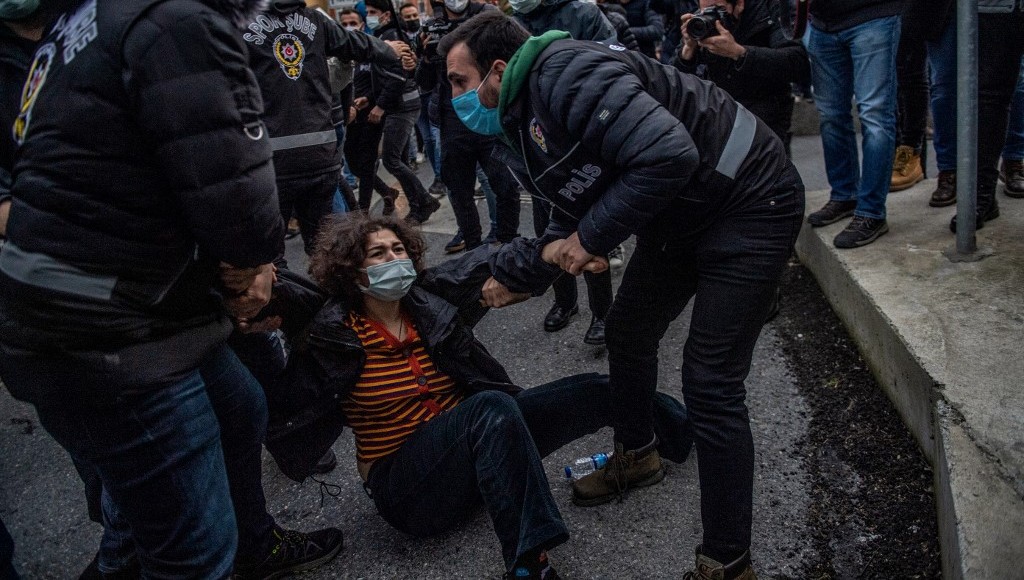Fenced in by riot police, Zeynep Kurbanzade stands with her university classmates in daily protest against the rector picked by President Recep Tayyip Erdoğan, who has ruled Turkey since she was just one year old.
Small in number, loud in voice and filled with a thirst for change, the Boğaziçi University students are posing a worrisome challenge to the 66-year-old Turkish leader, who has responded by flooding the streets with police.
For the religiously conservative Erdoğan, their social media-driven campaign — now in its second month — has ominous echoes of 2013 protests that began in defence of an İstanbul park before morphing into a national movement.
For the students, the appointment of Melih Bulu, a losing parliamentary candidate from Erdoğan’s ruling party who denies claims of plagiarising his doctorate thesis, as head of the elite İstanbul institution was the last straw in a life filled with discontent.
“We are not happy with the economy, we are not happy with the growing pressure,” Kurbanzade, 19, told AFP outside the campus, which has been besieged by police barricades since the start of the year.
“Acts of femicide go unpunished, mobsters walk free from jail and are given the red carpet treatment, but our friends are detained because of a tweet. We don’t accept this,” she said.
Police have fired rubber bullets and tear gas while detaining hundreds across İstanbul and in smaller solidarity rallies in big cities such as Ankara and İzmir.
Although most are quickly released, the jailings and heavy-handed police tactics remind many of the sweeping powers Erdoğan has assumed since surviving a coup bid in 2016, which was followed by a punishing social and political crackdown.
“A mood of discontent — from the presidential regime to the economic collapse — has found a new form of expression through Boğaziçi,” said Zeynep Gambetti, an associate professor of political theory at the university.
Culture wars
After initially ignoring the protests, Erdoğan this month decided to turn them into part of a broader culture war being waged across Turkey’s deeply polarised society.
For the first time since assuming power in 2003, he unleashed several verbal assaults on the LGBT movement, blaming it for the protests with a venom that drew immediate condemnation from the United States and the European Union.
“Don’t pay attention to what those lesbians say,” he told a group of female supporters last week, defending Bulu’s appointment as lawful.
The students have responded to Erdoğan on the streets and on Twitter, with several who run the protests’ social media accounts jailed and charged with insulting the president.
“Kayyum Rektör İstemiyoruz!” (We don’t want a trustee rector) has become a rallying cry, a protest against Erdoğan’s decision in 2016 to start picking the heads of universities.
For many students and professors, these appointments run similar to his naming of government trustees in place of dozens of mayors who have been dismissed or jailed for alleged links to outlawed Kurdish militants.
“What we need to discuss is autonomy at universities but we talk about detentions. Who benefits from the chaos? Not us,” said Tınaz Ekim, a professor of industrial engineering at the university.
‘An overreaction’
Üstün Ergüder, who served two terms as Boğaziçi University’s elected rector in the 1990s, compared this standoff to the late 1970s, when left and right-wing militants clashed across the streets of Ankara and İstanbul.
Eventually the army seized power in a 1980 putsch, but even then the 158-year-old institution remained an island of stability, Ergüder recalled.
“When I was a young academic in the 1970s, all the universities were in a state of war. Even under those circumstances, education at Boğaziçi continued uninterrupted,” Ergüder told AFP.
“We could calm (the protests on campus) without the police, but today there’s an overreaction.”
Ergüder said Bulu visited him in his home soon after being appointed.
“I told him how his predecessor won the hearts and minds, and advised him to build bridges. He carefully listened and took notes.”
Bulu told a pro-government newspaper last week: “I never think about resigning.”
Strong headwinds
The students are facing formidable headwinds, from the brute power of the police, to the absence of a natural protest leader, to their mistrust in other political parties.
For all of these reasons, Özgür Ünlühisarcıklı of the US German Marshall Fund said it was unlikely that the protests would grow.
“There is an understanding among opposition parties that mass protests lead to polarisation and galvanise Erdoğan’s supporters,” said Ünlühisarcıklı.
One Western diplomat told AFP that he could detect “no sign so far” that the protests could broaden.
But for now, at least, the students and their supporters vow defiance.
“These youngsters live on the internet, see blocked websites, bans, detentions over a tweet, all sorts of pressure, so they feel compelled to channel their frustration in one way or another,” said political analyst Gürkan Özturan, a Boğaziçi graduate.
AFP

